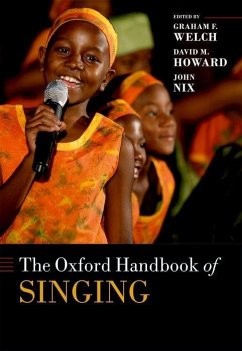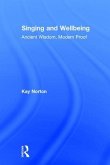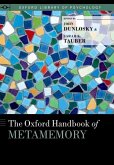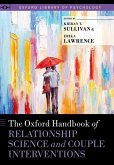The Oxford Handbook of Singing
Herausgeber: Welch, Graham F; Nix, John; Howard, David M
The Oxford Handbook of Singing
Herausgeber: Welch, Graham F; Nix, John; Howard, David M
- Gebundenes Buch
- Merkliste
- Auf die Merkliste
- Bewerten Bewerten
- Teilen
- Produkt teilen
- Produkterinnerung
- Produkterinnerung
Singing has been a characteristic behaviour of humanity across several millennia. Including fifty-three chapters by seventy-two authors, drawn from across the world, The Oxford Handbook of Singing is a landmark text on this topic. It is a comprehensive resource that is essential for anyone who wishes to know more about the nature of singing.
Andere Kunden interessierten sich auch für
![Singing and Wellbeing Singing and Wellbeing]() Kay NortonSinging and Wellbeing197,99 €
Kay NortonSinging and Wellbeing197,99 €![The Oxford Handbook of Traumatic Stress Disorders The Oxford Handbook of Traumatic Stress Disorders]() The Oxford Handbook of Traumatic Stress Disorders171,99 €
The Oxford Handbook of Traumatic Stress Disorders171,99 €![The Oxford Handbook of Cognitive Archaeology The Oxford Handbook of Cognitive Archaeology]() Thomas WynnThe Oxford Handbook of Cognitive Archaeology269,99 €
Thomas WynnThe Oxford Handbook of Cognitive Archaeology269,99 €![The Oxford Handbook of Cognitive and Behavioral Therapies The Oxford Handbook of Cognitive and Behavioral Therapies]() The Oxford Handbook of Cognitive and Behavioral Therapies251,99 €
The Oxford Handbook of Cognitive and Behavioral Therapies251,99 €![The Oxford Handbook of Metamemory The Oxford Handbook of Metamemory]() The Oxford Handbook of Metamemory251,99 €
The Oxford Handbook of Metamemory251,99 €![The Oxford Handbook of Relationship Science and Couple Interventions The Oxford Handbook of Relationship Science and Couple Interventions]() The Oxford Handbook of Relationship Science and Couple Interventions251,99 €
The Oxford Handbook of Relationship Science and Couple Interventions251,99 €![The Oxford Handbook of the Psychology of Competition The Oxford Handbook of the Psychology of Competition]() The Oxford Handbook of the Psychology of Competition189,99 €
The Oxford Handbook of the Psychology of Competition189,99 €-
-
-
Singing has been a characteristic behaviour of humanity across several millennia. Including fifty-three chapters by seventy-two authors, drawn from across the world, The Oxford Handbook of Singing is a landmark text on this topic. It is a comprehensive resource that is essential for anyone who wishes to know more about the nature of singing.
Hinweis: Dieser Artikel kann nur an eine deutsche Lieferadresse ausgeliefert werden.
Hinweis: Dieser Artikel kann nur an eine deutsche Lieferadresse ausgeliefert werden.
Produktdetails
- Produktdetails
- Verlag: Oxford University Press, USA
- Seitenzahl: 1200
- Erscheinungstermin: 11. Juni 2019
- Englisch
- Abmessung: 254mm x 176mm x 66mm
- Gewicht: 2402g
- ISBN-13: 9780199660773
- ISBN-10: 0199660778
- Artikelnr.: 54849768
- Herstellerkennzeichnung
- Libri GmbH
- Europaallee 1
- 36244 Bad Hersfeld
- gpsr@libri.de
- Verlag: Oxford University Press, USA
- Seitenzahl: 1200
- Erscheinungstermin: 11. Juni 2019
- Englisch
- Abmessung: 254mm x 176mm x 66mm
- Gewicht: 2402g
- ISBN-13: 9780199660773
- ISBN-10: 0199660778
- Artikelnr.: 54849768
- Herstellerkennzeichnung
- Libri GmbH
- Europaallee 1
- 36244 Bad Hersfeld
- gpsr@libri.de
Graham Welch PhD has held the UCL Institute of Education (formerly University of London) Established Chair of Music Education since 2001. He is a Past President of the International Society for Music Education (ISME) (2008-2014) and elected Chair of the internationally based Society for Education, Music and Psychology Research (SEMPRE). He holds Visiting Professorships at universities in the UK and overseas and is a former member of the UK Arts and Humanities Research Council (AHRC) Review College for Music (2007-2015). Publications number approximately three hundred and fifty and embrace musical development and music education, teacher education, the psychology of music, singing and voice science, and music in special education and disability. David M Howard was elected Fellow of the Royal Academy of Engineering in 2016 and in that same year he became the Founding Head of the new department of Electronic Engineering at Royal Holloway, University of London, where he has set at its heart the principle of nurturing creativity in the context of group working for practical projects in each of the first two years. This is supported with a creative thinking space, prototyping lab and fabrication lab with 3-D printers and laser cutting machines for realising prototype designs. He has been Editor-in-Chief of Logopedics, Phoniatrics, Vocology and is on the Editorial Boards of Journal of Voice, Forensic Linguistics, Organised Sound, International Journal of Research in Choral Singing and Journal of Interdisciplinary Music Studies. In 2014, David was made an Honorary Member of the Association of Croatian Choral Directors in which guise he acted as a judge for the International choir competition in %Sibenik in Croatia in May 2018. John Nix has a bachelor of music (voice performance, University of Georgia), a master of music education (arts administration, Florida State University), a master of music (voice performance, University of Colorado), and a certificate in vocology (University of Iowa). He is professor of voice and voice pedagogy at the University of Texas-San Antonio, and has an adjunct appointment in the Department of Speech Language Pathology at the University of Texas Health Sciences Center in San Antonio. His mentors include Barbara Doscher (singing, pedagogy) and Ingo Titze (voice science). His students have sung with the Santa Fe, Arizona, Chautauqua, St. Louis, Nevada, Omaha, and San Antonio opera companies, and two of his current or past students have been master teachers in the NATS Intern Program. In addition to his active voice teaching studio, he performs research in voice pedagogy, literature, and acoustics, having produced 38 published articles and 8 book chapters.
* PART 1: The Anatomy and Physiology of Singing
* 1: Gillyanne Kayes: Structure and Function of the Singing Voice
* 2: Tara K Stadelman-Cohen and Robert E Hillman: Voice Dysfunction and
Recovery
* 3: John S Rubin and Ruth Epstein: The Healthy Voice, Lifestyle and
Voice Protection (including Exercise, Body Work and Diet)
* 4: Filipa M B Lã and Brian P Gill: Physiology and its Impact on the
Performance of Singing
* PART 2: The Acoustics of Singing
* 5: Alan Watson: Breathing in Singing
* 6: Christian T Herbst, David M Howard and Jan G Svec: The Sound
Source in Singing: Basic Principles and Muscular Adjustments for
Fine-tuning Vocal Timbre
* 7: Brad Story: The Vocal Tract in Singing
* 8: Johan Sundberg: The Acoustics of Different Genres of Singing
* 9: Desmond Sergeant: The Developing Voice
* 10: David M Howard and Eric J Hunter: Perceptual Features of Singing
* 11: Harald Jers: The Impact of Location on the Singing Voice
* PART 3: The Psychology of Singing
* 12: Boris A Kleber and Jean Mary Zarate: The Neuroscience of Singing
* 13: Johan Sundberg: Intonation in Singing
* 14: Eduardo Coutinho, Klaus R Scherer and Nicola Dibben: Singing and
Emotion
* 15: Evangelos Himonides: Perceived Quality of a Singing Performance:
The Importance of Context
* 16: Karen Wise: Defining and Explaining Singing Difficulties in
Adults
* 17: Simone Dalla Bella: Vocal Performance in Occasional Singers
* 18: Graham F Welch and Costanza Preti: Singing as Inter- and
Intra-personal Communication
* 19: Annabel J Cohen and Karen M Ludke: Digital Libraries for Singing:
The Example of the AIRS Project
* PART 4: The Development of Singing across the Lifespan
* 20: Robert Walker: Socio-cultural, Acoustic, and Environmental
Imperatives in the World of Singing
* 21: Sheila C Woodward: Fetal, Neonatal and Early Infant Experiences
of Maternal Singing
* 22: Sandra E Trehub and Helga Rut Gudmundsdottir: Mothers as Singing
Mentors for Infants
* 23: Margaret S Barrett: Singing and Invented Song-making in Infants
and Young Children's Early Learning and Development: from Shared to
Independent Song-making
* 24: Valentine Harding: Children Singing: Nurture, Creativity, and
Culture. A Study of Children's Music-making in London, UK, and in
West Bengal, India
* 25: Graham F Welch: Singing and Vocal Development
* 26: Jenevora Williams and Scott Harrison: Boys' Singing Voice Change
in Adolescence
* 27: Lynne Gackle: Adolescent Girls' Singing Development
* 28: Diana Parkinson: The Effects of Gender on the Motivation and
Benefits Associated with Community Singing in the UK
* 29: Jane Davidson and Lynne Murray: Voice Management and the Older
Singer
* PART 5: Singing Pedagogy
* 30: John Nix: Systematic Development of Vocal Technique
* 31: Susan Knight: Addressing the Needs of the Adult "Non-Singer"
("NS")
* 32: Jean Callaghan: Teaching the Professional Singer
* 33: Alma Thomas: Mental Preparation for the Performer
* 34: Mary King and John Nix: Conservatory Teaching and Learning
* 35: Jeremy Fisher, Gillyanne Kayes and Lisa Popeil: Pedagogy of
Different Sung Genres
* 36: Michael Edward Edgerton: The Extra-normal Voice
* 37: Yang Yang, Aaron Carter-Enyi, Nandhu Radhakrishnan, Sophie
Grimmer, and John Nix: Vocal Music and Pedagogy of Chinese, African
and Indian Genres
* PART 6: The Collective 'Choral' Voice
* 38: Ursula Geisler and Karin Johansson: Contemporary Concepts and
Practices of Choral Singing
* 39: Joy Hill: The Youth Choir
* 40: Timothy Day: Cultural History and a Singing Style: "The English
Cathedral Tradition"
* 41: Colin Durrant and Maria Varvarigou: Perspectives on Choral
Conducting: Theory and Practice
* 42: Jane Davidson and Robert Faulkner: Group Singing and Social
Identity
* 43: David M Howard: Intonation and Staying in Tune in A Cappella
Choral Singing
* 44: Dag Jansson: Choral Singers' Perceptions of Musical Leadership
* PART 7: The Wider Benefits of Singing
* 45: Stephen Clift and Rebekah Gilbert: Can Singing have a Beneficial
Effect on Lung Function and Breathing for People with Respiratory
Illness?
* 46: Jane W Davidson and Sandra Garrido: Singing and Psychological
Needs
* 47: Töres Theorell: The Effects and Benefits of Singing Individually
and in a Group
* 48: June Boyce-Tillman: Unchained Melody: The Rise of Orality and
Therapeutic Singing
* PART 8: Singing and Technology
* 49: Harm K Schutte: Historical Approaches in Revealing the Singing
Voice, Part 1
* 50: Harm K Schutte: Historical Approaches in Revealing the Singing
Voice, Part 2
* 51: Evangelos Himonides: Ave Verum Pentium: Singing, Recording,
Archiving and Analysing within the Digital Domain
* 52: Garyth Nair (decd), David M Howard, and Graham F Welch: Practical
Voice Analyses and their Application in the Studio
* 53: Peter Pabon, David M Howard, Sten Ternström, Malte Kob and
Gerhard Eckel: Future Perspectives
* 1: Gillyanne Kayes: Structure and Function of the Singing Voice
* 2: Tara K Stadelman-Cohen and Robert E Hillman: Voice Dysfunction and
Recovery
* 3: John S Rubin and Ruth Epstein: The Healthy Voice, Lifestyle and
Voice Protection (including Exercise, Body Work and Diet)
* 4: Filipa M B Lã and Brian P Gill: Physiology and its Impact on the
Performance of Singing
* PART 2: The Acoustics of Singing
* 5: Alan Watson: Breathing in Singing
* 6: Christian T Herbst, David M Howard and Jan G Svec: The Sound
Source in Singing: Basic Principles and Muscular Adjustments for
Fine-tuning Vocal Timbre
* 7: Brad Story: The Vocal Tract in Singing
* 8: Johan Sundberg: The Acoustics of Different Genres of Singing
* 9: Desmond Sergeant: The Developing Voice
* 10: David M Howard and Eric J Hunter: Perceptual Features of Singing
* 11: Harald Jers: The Impact of Location on the Singing Voice
* PART 3: The Psychology of Singing
* 12: Boris A Kleber and Jean Mary Zarate: The Neuroscience of Singing
* 13: Johan Sundberg: Intonation in Singing
* 14: Eduardo Coutinho, Klaus R Scherer and Nicola Dibben: Singing and
Emotion
* 15: Evangelos Himonides: Perceived Quality of a Singing Performance:
The Importance of Context
* 16: Karen Wise: Defining and Explaining Singing Difficulties in
Adults
* 17: Simone Dalla Bella: Vocal Performance in Occasional Singers
* 18: Graham F Welch and Costanza Preti: Singing as Inter- and
Intra-personal Communication
* 19: Annabel J Cohen and Karen M Ludke: Digital Libraries for Singing:
The Example of the AIRS Project
* PART 4: The Development of Singing across the Lifespan
* 20: Robert Walker: Socio-cultural, Acoustic, and Environmental
Imperatives in the World of Singing
* 21: Sheila C Woodward: Fetal, Neonatal and Early Infant Experiences
of Maternal Singing
* 22: Sandra E Trehub and Helga Rut Gudmundsdottir: Mothers as Singing
Mentors for Infants
* 23: Margaret S Barrett: Singing and Invented Song-making in Infants
and Young Children's Early Learning and Development: from Shared to
Independent Song-making
* 24: Valentine Harding: Children Singing: Nurture, Creativity, and
Culture. A Study of Children's Music-making in London, UK, and in
West Bengal, India
* 25: Graham F Welch: Singing and Vocal Development
* 26: Jenevora Williams and Scott Harrison: Boys' Singing Voice Change
in Adolescence
* 27: Lynne Gackle: Adolescent Girls' Singing Development
* 28: Diana Parkinson: The Effects of Gender on the Motivation and
Benefits Associated with Community Singing in the UK
* 29: Jane Davidson and Lynne Murray: Voice Management and the Older
Singer
* PART 5: Singing Pedagogy
* 30: John Nix: Systematic Development of Vocal Technique
* 31: Susan Knight: Addressing the Needs of the Adult "Non-Singer"
("NS")
* 32: Jean Callaghan: Teaching the Professional Singer
* 33: Alma Thomas: Mental Preparation for the Performer
* 34: Mary King and John Nix: Conservatory Teaching and Learning
* 35: Jeremy Fisher, Gillyanne Kayes and Lisa Popeil: Pedagogy of
Different Sung Genres
* 36: Michael Edward Edgerton: The Extra-normal Voice
* 37: Yang Yang, Aaron Carter-Enyi, Nandhu Radhakrishnan, Sophie
Grimmer, and John Nix: Vocal Music and Pedagogy of Chinese, African
and Indian Genres
* PART 6: The Collective 'Choral' Voice
* 38: Ursula Geisler and Karin Johansson: Contemporary Concepts and
Practices of Choral Singing
* 39: Joy Hill: The Youth Choir
* 40: Timothy Day: Cultural History and a Singing Style: "The English
Cathedral Tradition"
* 41: Colin Durrant and Maria Varvarigou: Perspectives on Choral
Conducting: Theory and Practice
* 42: Jane Davidson and Robert Faulkner: Group Singing and Social
Identity
* 43: David M Howard: Intonation and Staying in Tune in A Cappella
Choral Singing
* 44: Dag Jansson: Choral Singers' Perceptions of Musical Leadership
* PART 7: The Wider Benefits of Singing
* 45: Stephen Clift and Rebekah Gilbert: Can Singing have a Beneficial
Effect on Lung Function and Breathing for People with Respiratory
Illness?
* 46: Jane W Davidson and Sandra Garrido: Singing and Psychological
Needs
* 47: Töres Theorell: The Effects and Benefits of Singing Individually
and in a Group
* 48: June Boyce-Tillman: Unchained Melody: The Rise of Orality and
Therapeutic Singing
* PART 8: Singing and Technology
* 49: Harm K Schutte: Historical Approaches in Revealing the Singing
Voice, Part 1
* 50: Harm K Schutte: Historical Approaches in Revealing the Singing
Voice, Part 2
* 51: Evangelos Himonides: Ave Verum Pentium: Singing, Recording,
Archiving and Analysing within the Digital Domain
* 52: Garyth Nair (decd), David M Howard, and Graham F Welch: Practical
Voice Analyses and their Application in the Studio
* 53: Peter Pabon, David M Howard, Sten Ternström, Malte Kob and
Gerhard Eckel: Future Perspectives
* PART 1: The Anatomy and Physiology of Singing
* 1: Gillyanne Kayes: Structure and Function of the Singing Voice
* 2: Tara K Stadelman-Cohen and Robert E Hillman: Voice Dysfunction and
Recovery
* 3: John S Rubin and Ruth Epstein: The Healthy Voice, Lifestyle and
Voice Protection (including Exercise, Body Work and Diet)
* 4: Filipa M B Lã and Brian P Gill: Physiology and its Impact on the
Performance of Singing
* PART 2: The Acoustics of Singing
* 5: Alan Watson: Breathing in Singing
* 6: Christian T Herbst, David M Howard and Jan G Svec: The Sound
Source in Singing: Basic Principles and Muscular Adjustments for
Fine-tuning Vocal Timbre
* 7: Brad Story: The Vocal Tract in Singing
* 8: Johan Sundberg: The Acoustics of Different Genres of Singing
* 9: Desmond Sergeant: The Developing Voice
* 10: David M Howard and Eric J Hunter: Perceptual Features of Singing
* 11: Harald Jers: The Impact of Location on the Singing Voice
* PART 3: The Psychology of Singing
* 12: Boris A Kleber and Jean Mary Zarate: The Neuroscience of Singing
* 13: Johan Sundberg: Intonation in Singing
* 14: Eduardo Coutinho, Klaus R Scherer and Nicola Dibben: Singing and
Emotion
* 15: Evangelos Himonides: Perceived Quality of a Singing Performance:
The Importance of Context
* 16: Karen Wise: Defining and Explaining Singing Difficulties in
Adults
* 17: Simone Dalla Bella: Vocal Performance in Occasional Singers
* 18: Graham F Welch and Costanza Preti: Singing as Inter- and
Intra-personal Communication
* 19: Annabel J Cohen and Karen M Ludke: Digital Libraries for Singing:
The Example of the AIRS Project
* PART 4: The Development of Singing across the Lifespan
* 20: Robert Walker: Socio-cultural, Acoustic, and Environmental
Imperatives in the World of Singing
* 21: Sheila C Woodward: Fetal, Neonatal and Early Infant Experiences
of Maternal Singing
* 22: Sandra E Trehub and Helga Rut Gudmundsdottir: Mothers as Singing
Mentors for Infants
* 23: Margaret S Barrett: Singing and Invented Song-making in Infants
and Young Children's Early Learning and Development: from Shared to
Independent Song-making
* 24: Valentine Harding: Children Singing: Nurture, Creativity, and
Culture. A Study of Children's Music-making in London, UK, and in
West Bengal, India
* 25: Graham F Welch: Singing and Vocal Development
* 26: Jenevora Williams and Scott Harrison: Boys' Singing Voice Change
in Adolescence
* 27: Lynne Gackle: Adolescent Girls' Singing Development
* 28: Diana Parkinson: The Effects of Gender on the Motivation and
Benefits Associated with Community Singing in the UK
* 29: Jane Davidson and Lynne Murray: Voice Management and the Older
Singer
* PART 5: Singing Pedagogy
* 30: John Nix: Systematic Development of Vocal Technique
* 31: Susan Knight: Addressing the Needs of the Adult "Non-Singer"
("NS")
* 32: Jean Callaghan: Teaching the Professional Singer
* 33: Alma Thomas: Mental Preparation for the Performer
* 34: Mary King and John Nix: Conservatory Teaching and Learning
* 35: Jeremy Fisher, Gillyanne Kayes and Lisa Popeil: Pedagogy of
Different Sung Genres
* 36: Michael Edward Edgerton: The Extra-normal Voice
* 37: Yang Yang, Aaron Carter-Enyi, Nandhu Radhakrishnan, Sophie
Grimmer, and John Nix: Vocal Music and Pedagogy of Chinese, African
and Indian Genres
* PART 6: The Collective 'Choral' Voice
* 38: Ursula Geisler and Karin Johansson: Contemporary Concepts and
Practices of Choral Singing
* 39: Joy Hill: The Youth Choir
* 40: Timothy Day: Cultural History and a Singing Style: "The English
Cathedral Tradition"
* 41: Colin Durrant and Maria Varvarigou: Perspectives on Choral
Conducting: Theory and Practice
* 42: Jane Davidson and Robert Faulkner: Group Singing and Social
Identity
* 43: David M Howard: Intonation and Staying in Tune in A Cappella
Choral Singing
* 44: Dag Jansson: Choral Singers' Perceptions of Musical Leadership
* PART 7: The Wider Benefits of Singing
* 45: Stephen Clift and Rebekah Gilbert: Can Singing have a Beneficial
Effect on Lung Function and Breathing for People with Respiratory
Illness?
* 46: Jane W Davidson and Sandra Garrido: Singing and Psychological
Needs
* 47: Töres Theorell: The Effects and Benefits of Singing Individually
and in a Group
* 48: June Boyce-Tillman: Unchained Melody: The Rise of Orality and
Therapeutic Singing
* PART 8: Singing and Technology
* 49: Harm K Schutte: Historical Approaches in Revealing the Singing
Voice, Part 1
* 50: Harm K Schutte: Historical Approaches in Revealing the Singing
Voice, Part 2
* 51: Evangelos Himonides: Ave Verum Pentium: Singing, Recording,
Archiving and Analysing within the Digital Domain
* 52: Garyth Nair (decd), David M Howard, and Graham F Welch: Practical
Voice Analyses and their Application in the Studio
* 53: Peter Pabon, David M Howard, Sten Ternström, Malte Kob and
Gerhard Eckel: Future Perspectives
* 1: Gillyanne Kayes: Structure and Function of the Singing Voice
* 2: Tara K Stadelman-Cohen and Robert E Hillman: Voice Dysfunction and
Recovery
* 3: John S Rubin and Ruth Epstein: The Healthy Voice, Lifestyle and
Voice Protection (including Exercise, Body Work and Diet)
* 4: Filipa M B Lã and Brian P Gill: Physiology and its Impact on the
Performance of Singing
* PART 2: The Acoustics of Singing
* 5: Alan Watson: Breathing in Singing
* 6: Christian T Herbst, David M Howard and Jan G Svec: The Sound
Source in Singing: Basic Principles and Muscular Adjustments for
Fine-tuning Vocal Timbre
* 7: Brad Story: The Vocal Tract in Singing
* 8: Johan Sundberg: The Acoustics of Different Genres of Singing
* 9: Desmond Sergeant: The Developing Voice
* 10: David M Howard and Eric J Hunter: Perceptual Features of Singing
* 11: Harald Jers: The Impact of Location on the Singing Voice
* PART 3: The Psychology of Singing
* 12: Boris A Kleber and Jean Mary Zarate: The Neuroscience of Singing
* 13: Johan Sundberg: Intonation in Singing
* 14: Eduardo Coutinho, Klaus R Scherer and Nicola Dibben: Singing and
Emotion
* 15: Evangelos Himonides: Perceived Quality of a Singing Performance:
The Importance of Context
* 16: Karen Wise: Defining and Explaining Singing Difficulties in
Adults
* 17: Simone Dalla Bella: Vocal Performance in Occasional Singers
* 18: Graham F Welch and Costanza Preti: Singing as Inter- and
Intra-personal Communication
* 19: Annabel J Cohen and Karen M Ludke: Digital Libraries for Singing:
The Example of the AIRS Project
* PART 4: The Development of Singing across the Lifespan
* 20: Robert Walker: Socio-cultural, Acoustic, and Environmental
Imperatives in the World of Singing
* 21: Sheila C Woodward: Fetal, Neonatal and Early Infant Experiences
of Maternal Singing
* 22: Sandra E Trehub and Helga Rut Gudmundsdottir: Mothers as Singing
Mentors for Infants
* 23: Margaret S Barrett: Singing and Invented Song-making in Infants
and Young Children's Early Learning and Development: from Shared to
Independent Song-making
* 24: Valentine Harding: Children Singing: Nurture, Creativity, and
Culture. A Study of Children's Music-making in London, UK, and in
West Bengal, India
* 25: Graham F Welch: Singing and Vocal Development
* 26: Jenevora Williams and Scott Harrison: Boys' Singing Voice Change
in Adolescence
* 27: Lynne Gackle: Adolescent Girls' Singing Development
* 28: Diana Parkinson: The Effects of Gender on the Motivation and
Benefits Associated with Community Singing in the UK
* 29: Jane Davidson and Lynne Murray: Voice Management and the Older
Singer
* PART 5: Singing Pedagogy
* 30: John Nix: Systematic Development of Vocal Technique
* 31: Susan Knight: Addressing the Needs of the Adult "Non-Singer"
("NS")
* 32: Jean Callaghan: Teaching the Professional Singer
* 33: Alma Thomas: Mental Preparation for the Performer
* 34: Mary King and John Nix: Conservatory Teaching and Learning
* 35: Jeremy Fisher, Gillyanne Kayes and Lisa Popeil: Pedagogy of
Different Sung Genres
* 36: Michael Edward Edgerton: The Extra-normal Voice
* 37: Yang Yang, Aaron Carter-Enyi, Nandhu Radhakrishnan, Sophie
Grimmer, and John Nix: Vocal Music and Pedagogy of Chinese, African
and Indian Genres
* PART 6: The Collective 'Choral' Voice
* 38: Ursula Geisler and Karin Johansson: Contemporary Concepts and
Practices of Choral Singing
* 39: Joy Hill: The Youth Choir
* 40: Timothy Day: Cultural History and a Singing Style: "The English
Cathedral Tradition"
* 41: Colin Durrant and Maria Varvarigou: Perspectives on Choral
Conducting: Theory and Practice
* 42: Jane Davidson and Robert Faulkner: Group Singing and Social
Identity
* 43: David M Howard: Intonation and Staying in Tune in A Cappella
Choral Singing
* 44: Dag Jansson: Choral Singers' Perceptions of Musical Leadership
* PART 7: The Wider Benefits of Singing
* 45: Stephen Clift and Rebekah Gilbert: Can Singing have a Beneficial
Effect on Lung Function and Breathing for People with Respiratory
Illness?
* 46: Jane W Davidson and Sandra Garrido: Singing and Psychological
Needs
* 47: Töres Theorell: The Effects and Benefits of Singing Individually
and in a Group
* 48: June Boyce-Tillman: Unchained Melody: The Rise of Orality and
Therapeutic Singing
* PART 8: Singing and Technology
* 49: Harm K Schutte: Historical Approaches in Revealing the Singing
Voice, Part 1
* 50: Harm K Schutte: Historical Approaches in Revealing the Singing
Voice, Part 2
* 51: Evangelos Himonides: Ave Verum Pentium: Singing, Recording,
Archiving and Analysing within the Digital Domain
* 52: Garyth Nair (decd), David M Howard, and Graham F Welch: Practical
Voice Analyses and their Application in the Studio
* 53: Peter Pabon, David M Howard, Sten Ternström, Malte Kob and
Gerhard Eckel: Future Perspectives








